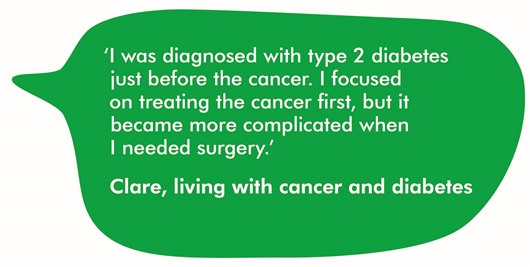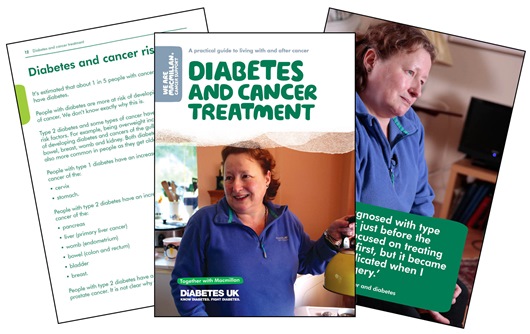Today is World Diabetes Day, when millions of people around the world come together to raise awareness of diabetes. In this blog, written by information production and promotion officer Genevieve, we talk about cancer and diabetes.
There are thought to be about 4.5 million people living with diabetes in the UK. This includes almost 3.5 million people who have actually been diagnosed with diabetes. But it also includes around 1.1 million people who have diabetes but have not been diagnosed.
What is diabetes?
Diabetes is a condition where the amount of glucose (a type of sugar) in the blood is too high. Our bodies use sugar for energy. When we eat, food is broken down so sugar and other nutrients can pass into the blood.
Normally, a hormone called insulin controls the amount of sugar in the blood. Insulin helps move sugar into the body’s cells, where it is converted into energy. Insulin is produced in a gland called the pancreas. If the pancreas stops making insulin, or doesn’t make enough, too much sugar stays in the blood.
Types of diabetes
There are two types of diabetes – type 1 and type 2.
It can happen at any age, but it is more common in children and young adults. It can sometimes run in families.
People can develop type 2 diabetes because of certain risk factors. These include: age, genetics, being overweight and your ethnicity.
Type 2 is a lot more common than type 1 – about 9 out of 10 (90%) people have type 2 diabetes.
Signs and symptoms of diabetes
The main symptoms of diabetes are:
Talk to your GP if you think you have symptoms of diabetes. But remember, these symptoms can be caused by many other conditions.
Diabetes and cancer risk
It’s estimated that about 1 in 5 people with cancer also have diabetes. People with diabetes are more at risk of developing certain types of cancer. We don’t know exactly why this is.
Type 2 diabetes and some types of cancer have some similar risk factors. For example, being overweight increases the risk of developing diabetes and cancers of the gullet (oesophagus), bowel, breast, womb and kidney. The risk of diabetes and cancer also increases as people get older.
Reducing your risk of cancer if you have diabetes
If you have diabetes, you can help to reduce your risk of developing cancer by:
We have more information to help you with these lifestyle choices. Diabetes UK also have some useful information to help you lead a healthy lifestyle.
Effects of cancer and its treatment if you have diabetes
Cancer treatments can affect your blood sugar levels. We have information about how steroids, chemotherapy, radiotherapy, surgery, hormonal therapy and targeted therapy can affect your diabetes.

Side effects of the cancer or its treatment can also have an impact if you have diabetes. For example, feeling or being sick. Being sick can be a problem when you have diabetes. If you can’t eat or drink, you could become dehydrated, and this can be more serious for people with diabetes. Your healthcare team will advise you about what you need to do to help manage your diabetes, such as checking your blood sugar more often.
If you are worried about how cancer, treatments or side effects might affect your diabetes, speak to a member of your healthcare team. They will give you more information and support.
Our new information about diabetes and cancer
We’ve produced a booklet about diabetes and cancer treatment, in partnership with Diabetes UK. We have written it for:
The booklet explains how some cancer treatments can affect diabetes and make it difficult to control blood sugar. It also has some tips to help you cope with side effects of cancer treatment if you have diabetes.
You can order or download the booklet at be.macmillan.org.uk You can also find the information on our website.

To see what else Macmillan's cancer information team has been blogging about, please visit our blog home page! You can subscribe to receive our blogs by email or RSS too.
We're with you every step of the way
The Macmillan team is here to help. Our cancer support specialists can answer your questions, offer support, or simply listen if you need a chat. Call us free on 0808 808 00 00.
Comments? Feel free to add them below (you need to be logged in).
Keep in touch Follow Macmillan’s cancer information team on Twitter @mac_cancerinfo
Whatever cancer throws your way, we’re right there with you.
We’re here to provide physical, financial and emotional support.
© Macmillan Cancer Support 2025 © Macmillan Cancer Support, registered charity in England and Wales (261017), Scotland (SC039907) and the Isle of Man (604). Also operating in Northern Ireland. A company limited by guarantee, registered in England and Wales company number 2400969. Isle of Man company number 4694F. Registered office: 3rd Floor, Bronze Building, The Forge, 105 Sumner Street, London, SE1 9HZ. VAT no: 668265007